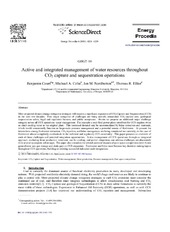Active and integrated management of water resources throughout CO2 capture and sequestration operations
Peer reviewed, Journal article
Published version
Permanent lenke
https://hdl.handle.net/1956/9720Utgivelsesdato
2011Metadata
Vis full innførselSamlinger
Originalversjon
https://doi.org/10.1016/j.egypro.2011.02.370Sammendrag
Most projected climate change mitigation strategies will require a significant expansion of CO2 Capture and Sequestration (CCS) in the next two decades. Four major categories of challenges are being actively researched: CO2 capture cost, geological sequestration safety, legal and regulatory barriers, and public acceptance. Herein we propose an additional major challenge category across all CCS operations: Water management. For example a coal-fired power plant retrofitted for CCS requires twice as much cooling water as the original plant. This increased demand may be accommodated by brine extraction and treatment, which would concurrently function as large-scale pressure management and a potential source of freshwater. At present the interactions among freshwater extraction, CO2 injection, and brine management are being considered too narrowly -in the case of freshwater almost completely overlooked- in the technical and regulatory CCS community. This paper presents an overview of each of these challenges and potential integration opportunities. Active management of CCS operations through an integrated approach -including brine production, treatment, use for cooling, and partial reinjection- can address challenges simultaneously with several synergistic advantages. The paper also considers the related potential impacts of pore space competition (with future groundwater use, gas storage and shale gas) on CCS expansion. Freshwater and brine must become key decision making inputs throughout CCS operations, building on existing successful industrial-scale integrations.

